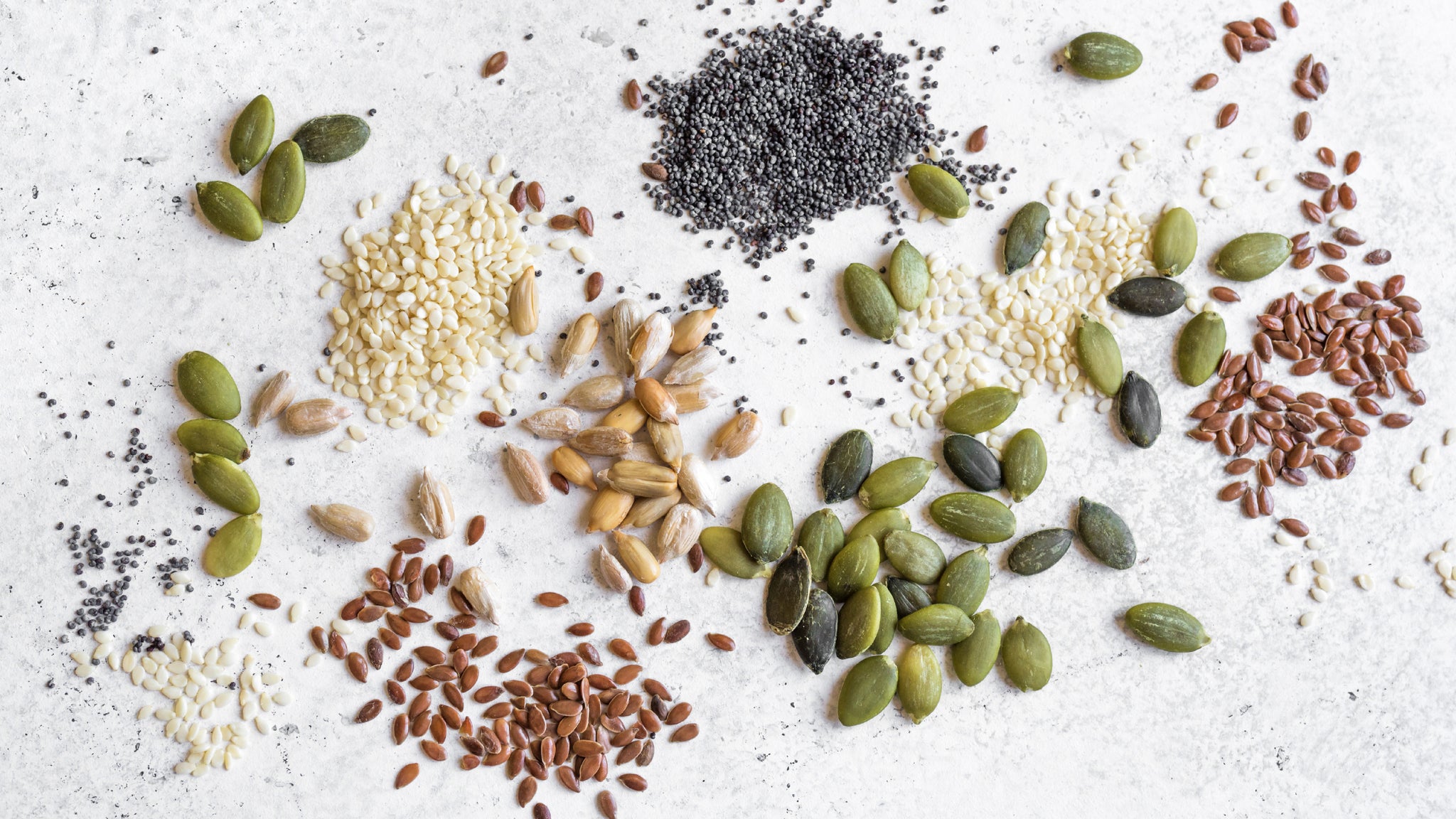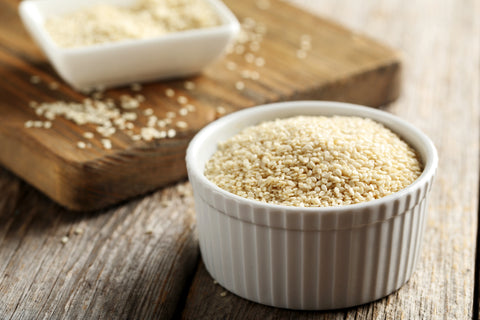Your Cart is Empty

It is said that great things come in small packages. Nowhere is this more evident than the tiny nutritional heavyweights that are seeds. Seeds might be tiny but as they are the base of complex plants, they are mighty in terms of nutritional benefits.
Seeds are loaded with monounsaturated and polyunsaturated fats, proteins, and stacked with fiber, as well as many essential vitamins and minerals. Seeds offer many of the same nutrients as multivitamins, but those of a plant-based variety, and packaging them in a small powerhouse of a package. Seeds provide a nutritional profile similar to nuts as well as being vastly versatile in how they can be consumed, constituting an important portion of many snack mixes and easily combined with a varied array of food items. Seeds provide human bodies with a vast profile of nutrients suitable for many heart-health centric diets including paleo, low-FODMAP, and are on the menu of many vegans.
Schools have increasingly been more concerned about the rise of nut allergies, stripping away the ability of many children to consume nuts. Seeds offer a fantastically nutritious alternative for schools to offer in their stead. Besides being containers holding far more energy than they have any business holding, seeds improve the digestive process and assist in promoting hormonal, immune, and cardiovascular health for any human’s body. Seeds have about 5 to 9 grams of protein per ounce, with certain seeds being great sources for omega3 fatty acids. In contrast, the omega-3 content of walnuts is about three times less than that of flax seeds and chia seeds.
Flax seeds are loaded with fiber and ALA (a particular type of omega-3 fatty acid). While the internal nutritional content of flax seeds is superb, its outer shell contains omega-3 acids not conducive to human digestion, so these seeds are best consumed in ground form.

They contain a variety of polyphenols, including lignans, a crucial antioxidant for the body’s use. These prompt reduction of cholesterols and other heart disease factors. In fact, studies have found that flaxseed consumption served to lower bad cholesterol (LDL) and lower blood pressure if consumed daily for several months.
Beyond that, flax seeds have been found to reduce the growth of breast cancer tumors in women as well as prostate cancer in men. This is in addition to reducing the risk of heart disease and lowering the risk of diabetes by reducing blood sugar.
Similar in their nutritional makeup, chia seeds are another great and healthy seed option. Loaded with antioxidant polyphenols, omega-3 acids, and fiber, they carry many of the same benefits for human health.

Some studies have shown that chia seed consumption increases ALA in the blood, a vital omega-3 acid that promotes the reduction of inflammation. The body can convert ALA fats into other omega-3 acids such as EPA (eicosapentaenoic acid) and DHA (docosahexaenoic acids). These are typically found in oily fish.
Other studies have found that chia seeds may help reduce blood sugar and act as an appetite suppressant. Eating 37 grams of chia seeds daily for 12 weeks was correlated to reducing levels of multiple inflammatory chemicals including CRP (C-reactive protein). They are also linked to the reduction of heart disease.
Sunflower seeds are heavy in Vitamin E, protein, monounsaturated fats. In middle-aged and elderly people, sunflower seeds have been linked to the reduction of heart disease risk as shown by a 6,000 adult study that found that a diet heavy in nuts and sesame (and other) seeds reduced inflammation. CRP, a pivotal chemical associated with inflammation has been shown to be reduced with consuming sunflower seeds in excess of 5 times per week.
 The high content of Vitamin E is a key factor in strengthening and maintaining cellular membrane integrity and is often said to give people shiny, strong hair, and glowing skin. They are so rich in Vitamin E, that just 2 spoons of sunflower seeds per day can equal to half of the required Vitamin E daily consumption, a vitamin lacking in most Americans’ diets. Human bodies are not able to absorb Vitamin E without fat, which is why it is pertinent that the sunflower seed introduces this important nutrient into our system.
The high content of Vitamin E is a key factor in strengthening and maintaining cellular membrane integrity and is often said to give people shiny, strong hair, and glowing skin. They are so rich in Vitamin E, that just 2 spoons of sunflower seeds per day can equal to half of the required Vitamin E daily consumption, a vitamin lacking in most Americans’ diets. Human bodies are not able to absorb Vitamin E without fat, which is why it is pertinent that the sunflower seed introduces this important nutrient into our system.
Sunflower seeds are also rich in Vitamin B-6 and thiamin which promote a healthy metabolism. They are also stacked with magnesium, which, when paired with Vitamin B-6 can reduce PMS symptoms. They also pack a punch with copper, manganese, phosphorus, and selenium. All of these also help to strengthen bone tissue, reduce blood pressure, and help to reduce symptoms of anxiety.
Pumpkin seeds are packed with iron, magnesium, manganese, vitamin K, and phosphorus. Much like other seeds, they are highly nutritious, but unlike other seeds, they have much higher iron content. This is especially applicable to those whose diets do not afford them much in the way of iron content, like vegans and vegetarians who do not get their protein content from animal products.
 The Vitamin-K in pumpkin seeds is similar to that of leafy greens as it helps to promote bone strength and optimal blood clotting. Because pumpkin seeds are rich in protein, they provide all essential amino acids as well as highly heart-healthy promoting and inflammation-reducing monounsaturated fats and omega-6 fatty acids.
The Vitamin-K in pumpkin seeds is similar to that of leafy greens as it helps to promote bone strength and optimal blood clotting. Because pumpkin seeds are rich in protein, they provide all essential amino acids as well as highly heart-healthy promoting and inflammation-reducing monounsaturated fats and omega-6 fatty acids.
A study in children found that regular pumpkin seed consumption can help lower the chances of bladder stones (similar to kidney stones, just forming in the bladder instead). They have also been found to reduce disorders involving the urinary tract and the prostate. For men with enlarged prostates, pumpkin seeds have been found to reduce the symptoms of an overactive bladder, as well as increase HDL (good cholesterol), reduced blood pressure, and lessen menopause symptoms in postmenopausal women.
Another type of seed that is high in fiber, protein, copper, manganese, magnesium, and a variety of monounsaturated and omega-6 fats are sesame seeds. Sesame seeds are one of the primary dietary sources of lignans, specifically, sesamin. Many Asian and Western cultures consume sesame seeds regularly in the form of tahini paste. 
Some studies have found that sesamin might be converted by the bacteria in the gut into enterolactone, another type of lignan. Enterolactone has the ability to lower the risk of heart disease and breast cancer by acting like estrogen. Women who have consumed 50 grams of sesame seed powder daily for 5 weeks have been found to have improved estrogen development and lower levels of cholesterol. Sesame seeds can also act as anti-inflammatories and can reduce the effects of several disorders such as arthritis and osteoarthritis. In athletes, consumption of pumpkin seeds has been shown to reduce oxidative stress and muscle damage, along with increasing aerobic capacity.
As evident by their nutritional benefits, adding seeds to one’s daily diet is a fantastic way to boost a variety of health benefits that these various seeds provide. The versatility of seeds makes their consumption simple. They can be added to salads, sprinkled on vegetable dishes, pesto, or even on rice and quinoa. Their texture is suitable for a variety of consumptions making them an easy addition to many meals. Seeds are a particularly popular inclusion in trail mixes as well. Combining their vast health benefits with those of nuts exponentially increases the overall health benefits of trail mixes. When looking for a healthy snack, a trail mix is a perfect combination to satisfy food cravings while delivering a serious nutritional punch.

tastani
January 03, 2023
How eating seeds are benefit to our health is a good information.thank you.The team at Tastani Foods is solely focused on bringing oils which is real and from nature available to everyone. We have taken up this rather ambitious project of moving every Indian household from the highly processed & packed foods to the real food from nature which our ancestors consumed for thousands of years.